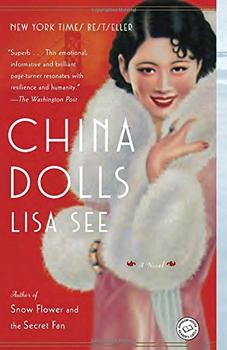Summary | Excerpt | Reading Guide | Reviews | Beyond the Book | Readalikes | Genres & Themes | Author Bio

Only three things cannot be long hidden:
the sun,
the moon,
and the truth.
(Attributed to Buddha)
P a r t O n e
The Sun
October 1938–July 1940
GRACE
A Measly Girl
I traveled west— alone— on the cheapest bus routes I could find. Every mile took me farther from Plain City, Ohio, where I'd been a flyspeck on the wallpaper of small-town life. Each new state I passed through loosened another rope around my heart, my legs, my arms, yet my whole body ached and I couldn't shake my vertigo. I lived on aspirin, crackers, and soda pop. I cried and cried and cried. On the eighth day, California. Many hours after crossing the boundary, I got off the bus and pulled my sweater a little more tightly around me. I expected sun and warmth, but on that October afternoon, fog hung over San Francisco, damp, and shockingly cold.
Picking up my suitcase, I left the bus station and started to walk. The receptionists at the cheap hotels I visited told me they were full. "Go to Chinatown," they suggested. "You can get a room there." I had no idea where Chinatown was, so that didn't help me. And I'll say this about San Francisco: lots of hills, water on practically every side, and, it seemed to me, not a single street ran purely in any one direction. Finally, a man at a fleabag took my money— a dollar a day, in advance— and gave me a key to a room.
I washed my hair in the basin and put it up in pin curls, then leaned in to the mirror to examine what remained of my injuries. My forehead had healed completely, but the inside of my skull continued to swim from being banged against the kitchen floor. The skin over my ribs was mottled green, gray, and purple. My shoulder still felt swollen and stiff from being dislocated and then jammed back into place, but the cut on my lip had nearly disappeared. I turned away and sat on the edge of the bed, hungry but too frightened to go out, and listening to the sound of God knows what coming through the walls.
I opened my purse and pulled out the magazine clipping Miss Miller, who'd taught me dance from the age of four, had torn from a magazine and given to me a few months earlier. I smoothed the advertisement with my palm so I could study the artist's sketch of the Golden Gate International Exposition. Even its location on Treasure Island seemed to beckon. "See, Grace, they're looking for six thousand workers," Miss Miller had said. "Dancers, singers, welders, carpenters. The whole works." She'd sighed then. "I wanted to go so many places when I was young, but it takes guts— and talent— to leave everything and everyone you know. You could do it, though." Her few words and that slip of paper had given me the courage to believe I actually could. After all, I'd won first prize at the Plain City Fair for my tap dancing and singing when I was seven and had held the title ever since.
You always planned to leave home, I told myself. Just because you had to escape sooner than expected doesn't mean you can't still fly to the stars.
But my pep talk— in a scary hotel room, in a strange city, in the middle of the night— did little to ease my fears. Once in bed, I could practically see the walls closing in around me. To calm myself, I began a routine I'd invented as a small child, running my hands the length of my arms (a broken tibia when I was three; my mom told Doc Haverford I fell down the stairs), slipping along my sides (several broken and fractured ribs over the years), and then lifting each leg and squeezing all the way to my feet (my legs had been a frequent target until I started dancing). The ritual both strengthened and soothed me. I was now alone in the world, with no home to return to and no one to rely on, but if I could survive my father's beatings and the petty prejudices of my hometown, then I could triumph over whatever obstacles the future threw my way. Maybe. Hopefully.
Excerpted from China Dolls by Lisa See. Copyright © 2014 by Lisa See. Excerpted by permission of Random House. All rights reserved. No part of this excerpt may be reproduced or reprinted without permission in writing from the publisher.
The worth of a book is to be measured by what you can carry away from it.
Click Here to find out who said this, as well as discovering other famous literary quotes!
Your guide toexceptional books
BookBrowse seeks out and recommends the best in contemporary fiction and nonfiction—books that not only engage and entertain but also deepen our understanding of ourselves and the world around us.